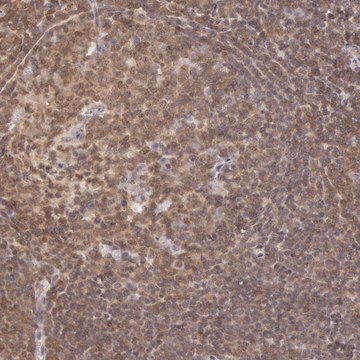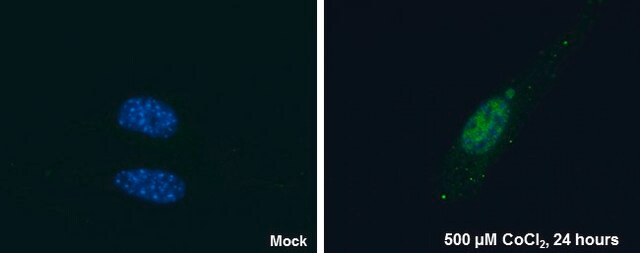SAB4200383
Anti-SMAD6 (C-terminal) antibody produced in rabbit
~1.0 mg/mL, affinity isolated antibody
Sinonimo/i:
Anti-MADH6, Anti-MADH7, Anti-SMAD family member 6
Scegli un formato
329,70 €
Prezzo di listino471,00 €Risparmia il 30%Scegli un formato
About This Item
329,70 €
Prezzo di listino471,00 €Risparmia il 30%Prodotti consigliati
Origine biologica
rabbit
Livello qualitativo
Coniugato
unconjugated
Forma dell’anticorpo
affinity isolated antibody
Tipo di anticorpo
primary antibodies
Clone
polyclonal
Stato
buffered aqueous solution
PM
antigen ~60 kDa
Reattività contro le specie
mouse, human, rat
Concentrazione
~1.0 mg/mL
tecniche
immunoprecipitation (IP): 5-10 μg using lysates of HEK-293T cells over-expressing human SMAD6.
indirect immunofluorescence: 10-20 μg/mL using mouse 3T3 cells.
western blot: 0.5-1.0 μg/mL using whole extracts of HEK-293T cells over-expressing human SMAD6.
N° accesso UniProt
Condizioni di spedizione
dry ice
Temperatura di conservazione
−20°C
modifica post-traduzionali bersaglio
unmodified
Informazioni sul gene
human ... SMAD6(4091)
mouse ... Smad6(17130)
rat ... Smad6(374096)
Categorie correlate
Descrizione generale
Immunogeno
Azioni biochim/fisiol
Stato fisico
Esclusione di responsabilità
Non trovi il prodotto giusto?
Prova il nostro Motore di ricerca dei prodotti.
Codice della classe di stoccaggio
10 - Combustible liquids
Punto d’infiammabilità (°F)
Not applicable
Punto d’infiammabilità (°C)
Not applicable
Scegli una delle versioni più recenti:
Certificati d'analisi (COA)
Non trovi la versione di tuo interesse?
Se hai bisogno di una versione specifica, puoi cercare il certificato tramite il numero di lotto.
Possiedi già questo prodotto?
I documenti relativi ai prodotti acquistati recentemente sono disponibili nell’Archivio dei documenti.
Filtri attivi
Il team dei nostri ricercatori vanta grande esperienza in tutte le aree della ricerca quali Life Science, scienza dei materiali, sintesi chimica, cromatografia, discipline analitiche, ecc..
Contatta l'Assistenza Tecnica.








